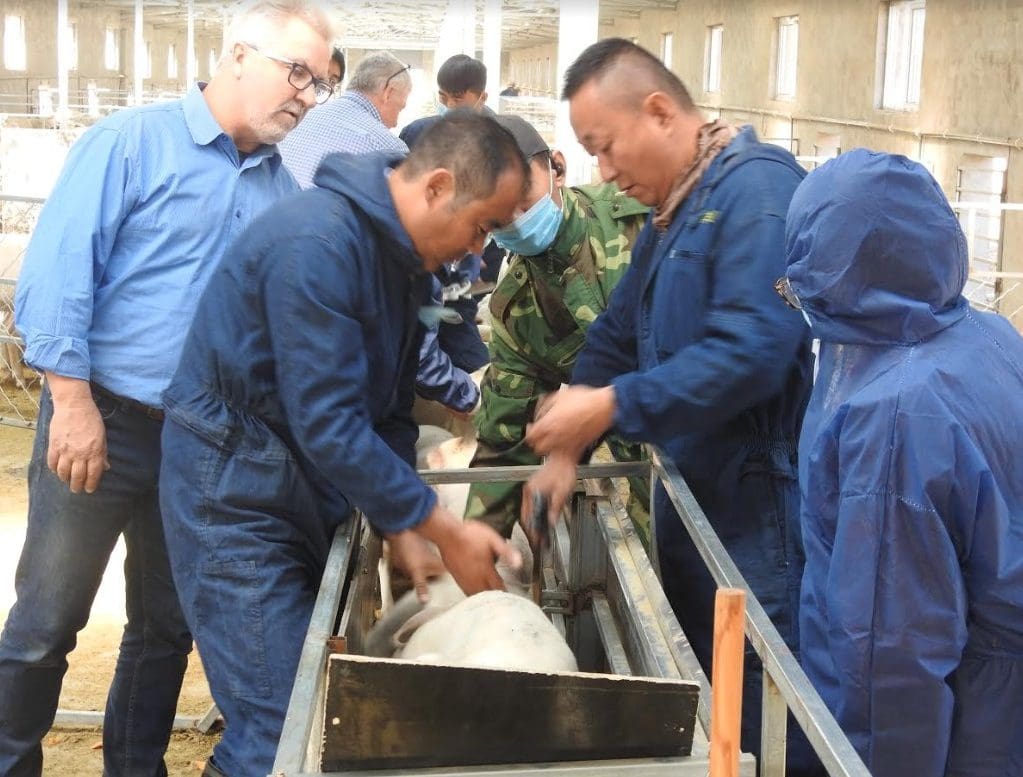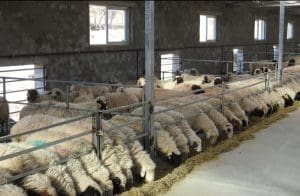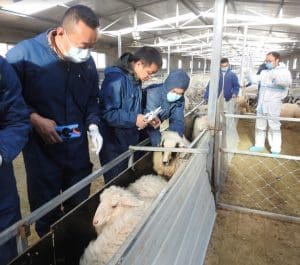
Apiam’s Ganshu project leader Dr David Osborne, left, oversees tagging of foundation flock ewes in China.
A JOINT Australian-Chinese initiative to boost China’s sheep meat production by doubling the production of local flocks over the next 3-5 years was announced this week.
Australian rural veterinary group Apiam Animal Health Ltd announced it will partner with the Chinese company Gansu Charming Sheep Breeder Co Ltd to establish breeds of meat sheep suited to Chinese conditions and markets.
Apiam managing director Chris Richards said the veterinary group had identified sheep breeds in Australia for the collection of semen and embryos to be used over two sheep breeds in China – the Hu and Tan.

Foundation Ganshu flock ewes in China.
The Chinese Hu sheep is known for its beautiful lambskin, early sexual maturity, and high fecundity (200-250pc). In the past, it has been crossed with the early-maturing Dorper breed to improve growth carcase traits in Hu sheep.
“We have selected rams from four high performance meat breeds to collect semen to implement a cross breeding program to double meat production in a sustainable way, including a measurement system.
“Our services will be providing a whole breeding and training system to establish new breeds for the Chinese sheep industry,” he said.
The project will also involve the collection of embryos in Australia.
Mr Richards would not disclose the size of the project or the breeds being identified here, but he said the initial ewe flock being established in China was “in the thousands”. He said the meat production performance of local Chinese sheep was not currently being measured.
“Initially this would involve fairly simple systems like measuring meat yield, but down the track we would hope that they would be able to implement some of the measurements we have here.”
Sheep breeding centre construction has started

A plan of the Ganshu sheep breeding centre.
Sheep produced by the project are expected to be managed in a large feedlot and construction of the sheep breeding centre in Ganshu Province has started. The term of the project is expected to be three to five years.
Under the consultancy and export agreement with Gansu Charming, the two parties will establish the state-of-the-art sheep breeding centre to help determine the optimal breed for the area. China has about 130 million sheep and is the world’s largest sheep meat producer. However, the country still needs to import sheep meat and is expected to remain a net importer over the next 10 years. The proportion of consumers in China who can regularly afford to buy imported lamb is small, and sheep meat currently accounts for only three percent of dietary protein consumption in China, Apiam said.
Mr Richards said China’s rapidly growing middle and upper classes are increasingly demanding alternative forms of protein, beyond traditional sources. Per capita sheep meat consumption is forecast to rise 14 per cent by 2027.
“Lamb is a relatively new and attractive product in this market (China), and we see this as a significant growth opportunity for Apiam, particularly given our skills and expertise in sheep genetics and reproduction,” Mr Richards said.
Apiam Genetic Services said it has experience in more than 30 breeds of sheep and goats in over 12 countries.
Apiam’s project leader Dr David Osborne, who has been leading Apiam sheep embryo transfer services in Australia and the USA, is excited about the opportunity in China.
“To get over there, see the opportunity to improve the genetics and the potential scale of the operations into the future is exciting for Apiam,” he said.

Chinese sheep being tagged for the Ganshu sheep meat project.
In a statement to the Australian Stock Exchange yesterday, Apiam said it will receive consulting revenues from the provision of advice associated with the centre design and set-up, and revenue from sheep breed selection. The company also will receive ongoing product and service revenues from the sale of sheep embryos and semen, and the provision of specialist veterinary services and training.
Dr Richards said the margin opportunity is attractive, and Apiam expects the China project to increase Apiam’s overall group gross margin.
The deal with Gansu will generate increased activity and leverage the cost base at Apiam’s specialist genetic facilities at Dubbo and Deniliquin, which have Chinese export accreditation, the company said.

HAVE YOUR SAY